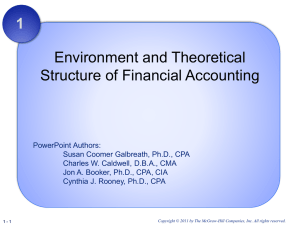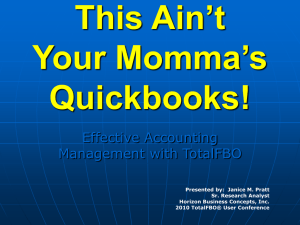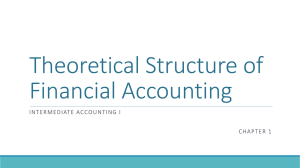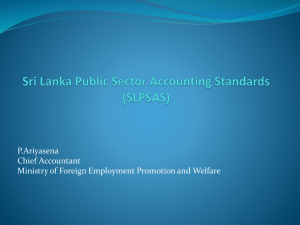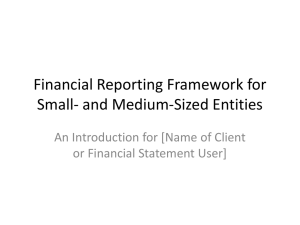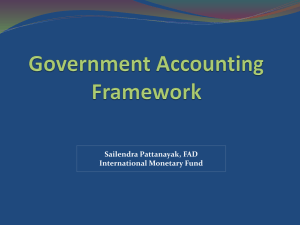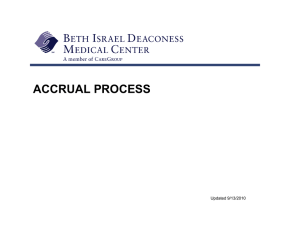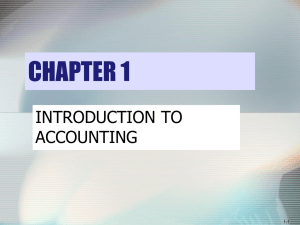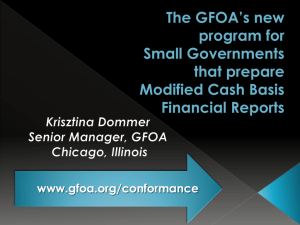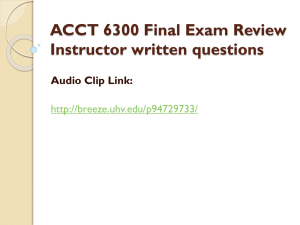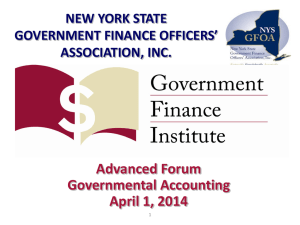Delinquencies & Charge-offs: Accounting
advertisement
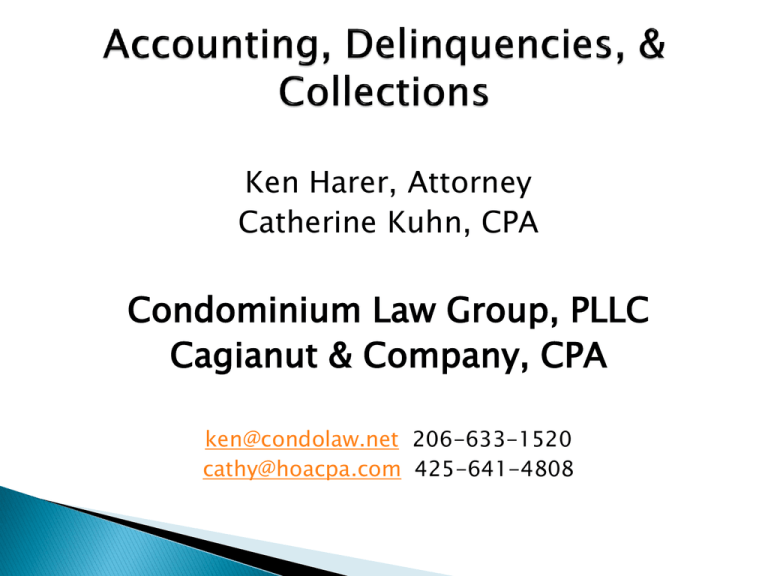
Ken Harer, Attorney Catherine Kuhn, CPA Condominium Law Group, PLLC Cagianut & Company, CPA ken@condolaw.net 206-633-1520 cathy@hoacpa.com 425-641-4808 Accounting Basics- Balance Sheet & Income Statement (Cathy) Cash vs. Accrual (Cathy) Delinquencies & Charge Offs- Accounting (Cathy) Delinquencies & Charge Offs – Legal (Ken) Late fees, interest, collection costsAccounting (Cathy) Late fees, interest, collection costs- Legal (Ken) Balance Sheet Financial Position at a Point in Time (ie Dec 31, 2012) Assets (What you OWN) Liabilities (What you OWE) Members’ Equity (Net Worth, Fund Balance, Retained Earnings) “Accounting Equation” ◦ Assets MINUS Liabilities EQUALS Members’ Equity ◦ Assets EQUAL Liabilities PLUS Members’ Equity(Balance!) • • Cash (Operating & Reserve) Accounts Receivable (Cash Yet to be Received) Typically Past Due Assessments (billing 1st of the month) Allowance for Bad Debt “contra” (offset) account • • Other Owner Receivables (Water billings, billbacks) Prepaid Insurance (Ins Premium Paid in Advance of Use) • • • Accounts Payable – Expenses to be paid Prepaid Assessments – Assessments that are paid in before they are owed to the Assn “Due between Funds” - Can be an asset or a liability depending on the Fund • What you OWN (Assets) less What you OWE (Liabilities) Two Types of Equity: • Operating • Reserves “Statement of Revenues & Expenses” Results over a period of time • • • • • Assessments Revenue - Should be total budgeted assessments for the year (accrual basis) Some allocated to operations, some to reserves Interest income (operating and reserve) Expenses – We all know what that is! “Net Income” Revenue Minus Expenses (Hopefully positive or $0!) Reserve Net Income can be positive or negative--- OKAY Cash– Checkbook Accounting – Recorded when PAID Accrual – Matches Income with Expense as incurred- Recorded when Incurred Revenue (Assessments) ◦ Accrual records assessments at the beginning of the month based on budget ◦ Cash records assessments as collected Expenses Accrual- Landscaper performs work in Januaryexpense recorded in January Income Statement Cash- Landscaper performs work in January and billed paid in February- Expense recorded in Feb GAAP is “Accrual” ◦ “Generally Accepted Accounting Principles” Old Act Condos: ◦ No mention of GAAP, we recommend GAAP New Act Condos: ◦ GAAP required- Resale Certificate Implications HOA Act: ◦ GAAP not required – Our preference is GAAP Legal opinion Old Act Condos: ◦ Resale Certificate provision of RCW 64.34.425(i) applies to Old Act Condos: “A balance sheet and a revenue and expense statement of the association prepared on an accrual basis, which shall be current to within one hundred twenty days”; New Act Condos: ◦ GAAP required by RCW 64.34.372(1)◦ Resale Certificate requirement as above HOA Act: ◦ GAAP not required, but would meet duty of care ReceivablesAccrual Accounting Creates “Accounts Receivable” BOD knows whether all amounts have been billed BOD knows whether amounts have been collected QUESTIONS ???? Allowance for Bad Debts ◦ “Contra Account” on the Balance Sheet ◦ All amounts ESTIMATED to be uncollectible at Balance Sheet date Bad Debt Expense ◦ ◦ Income Statement item Total amount estimated to be uncollectible for the period/year BUDGET for bad debt expense BOARD needs to APPROVE any write-offs to Accounts Receivable (fraud prevention) OK to keep Delinquencies on the AR “Aging” so that the board can keep pursuing the bad debt (Provide for the “bad debt” in the “bad debt allowance” on the Balance Sheet) AR Aging (in total) agrees to the Balance Sheet, then offset AR with Allowance Timing of charge offs has consequences ◦ Does GAAP have standards for timing? Charged off amounts are no longer “delinquent” Charged off amounts would not be reported on Resale Certificates. Delinquencies over 60 days affect FHA approvals Delinquencies may affect financing options Timing of recognizing income has consequences also ◦ Does GAAP have standards for recognition of income from fines and interest? CondoLaw would prefer conservative policy so as to not overstate finances of the community. ◦ Charge off early ◦ Recognize fines and interest when paid Challenges with recoverable attorney fees Board’s duty of care to accurately represent the financial condition of the association ◦ Does Accrual or Cash accounting better do this? ◦ Timing of charge offs and income recognition will affect how owners, buyers, and financial institutions view the health of the association. How do you determine the likelihood of payment on delinquent assessments? How do you determine the likelihood of payment for fees and fines assessed to units? How do you account for these when file is sent to an attorney? ◦ Neutral on accrual, impacts cash flow How do you account for these when file is sent to a collection company? ◦ Charged off, and any recovery is unbudgeted income? ◦ Take full hit on balance sheet when sent Can you estimate likelihood of recovery? Passage of time – limitation of 3 years Change of ownership – bank foreclosures Abandonment – Bankruptcy of owner ◦ Debt owed by the PERSON ◦ Debt owned by the PROPERTY – not affected Many of these events will trigger immediate recognition of a loss Distinction between “charging off” for accounting purposes and abandoning collection efforts. Judgments may have “value” for years, even if fully charged off. Recommend boards adopt a policy for charge offs. May be part of the collection policy Late Fees- Billed to the AR ledger according to policy ◦ If written off, charge to bad debt expense Legal Fee Income- Bill directly to the HO ledger (AR) as the association incurs the legal cost – separate income account Legal fee Income and Legal expenses should net to $0 in the accounting period (keep collection legal costs separate) BOD approval for write offs Interest income from owners- keep separate income account from bank interest income ◦ Owner interest income is NOT taxable How do you account for legal fees that are also collectible from the unit owner? Is It both an expense and income on the accrual ledger? Attorney fees that you are unlikely to collect must also be charged off as bad debt. Sometimes these costs are incurred for reasons not related to collection. Thank you! Ken Harer, Attorney Catherine Kuhn, CPA Condominium Law Group, PLLC Cagianut & Company, CPA ken@condolaw.net 206-633-1520 cathy@hoacpa.com 425-641-4808
